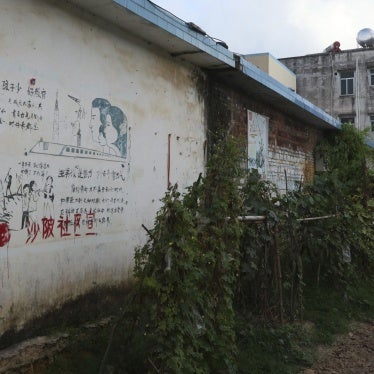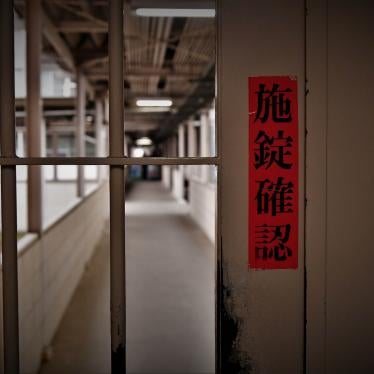Mr. Ken Loo
Secretary-General
Garment Manufacturers Association of Cambodia
Phnom Penh
March 19, 2015
Re: Human Rights Watch’s Cambodian Garment Workers Report
Dear Mr. Loo,
We are writing in response to the public statement issued by the Garment Manufacturers Association of Cambodia regarding the Human Rights Watch report, “‘Work Faster or Get Out’: Labor Rights Abuses in Cambodia’s Garment Industry."[1]
Your response challenged the objectivity and accuracy of our findings. We have a detailed methodology section that outlines the rigor and extent of our research. In addition to interviews with 270 workers from 73 garment factories across 5 provinces, our report referenced recent survey data from independent third parties such as Better Factories Cambodia (BFC) and the International Labor Organization (ILO) where these were available.
We also draw your attention to the fact that we sent letters to 58 garment factories in the course of our research; unfortunately, only two responded. Officials from one garment company met with us and their concerns are reflected in the report.
BFC and ILO findings
Your statement says that “[t]he violations highlighted in the report are clearly the exception in our industry rather than the norm.” Unfortunately, we have not found that to be the case. In addition to our findings, BFC synthesis reports and ILO thematic reports have extensive information on prevalence of labor law violations that correspond with ours findings. For example:
-
The latest BFC synthesis report shows that since 2011 nearly a third of all garment factories monitored have used fixed-duration contracts to avoid paying maternity leave, seniority bonus, and so on. It also reports an increase in the number of factories using fixed-duration contracts for more than two years.
-
A 2012 ILO study on gender equality in the garment sector found that 72 percent of participants believed that factories discriminated at the time of hiring and 48 percent said they had experienced discrimination based on sex, pregnancy, marital status, or age, and union affiliation for male members. This report also revealed that 1 in 5 workers surveyed reported sexual harassment at the workplace.
-
BFC consistently reported high levels of excessive overtime—around 85 percent of factories—in all factories surveyed.
-
BFC recorded in its 31st synthesis report that the use of Fixed Duration Contracts in a discriminatory manner—putting men on shorter term contracts—was becoming an increasing trend.
Limits of BFC Monitoring and Reporting
BFC monitoring plays a key role in identifying workplace problems and their Advisory Services are a valuable resource with respect to remediation. However, BFC does not include all factories in Cambodia. It is still in the process of expanding its monitoring of all factories with export licenses. A vast majority of subcontractor factories without export licenses are not monitored by BFC because it does not have the mandate to monitor these factories. Some of the worst problems Human Rights Watch documented took place in these subcontractor factories and there should be a stronger emphasis on expanding inspections to them. Furthermore, very few factories monitored by BFC have enrolled in its Advisory Services, which brands and factories may purchase at a cost.
Recommendations
We welcome your statement that “GMAC and all its members are committed to eliminating all such breaches of workers’ rights and dignity in our factories,” and urge you to take the following steps:
-
Promote compliance with labor law and Arbitration Council awards, including by seeking a list and following up with all garment factories that have not complied with binding Arbitral Awards issued when the Memorandum of Understanding (MoU) on Arbitral Awards was in effect.
-
Renew the MoU on Arbitral Awards within the next few months.
-
Sign an MoU with Better Factories Cambodia to:
-
Automatically enroll all GMAC member-factories monitored by BFC in their Advisory Services, and contribute to the Advisory Services.
-
Cover all GMAC subcontractor factories in BFC’s Monitoring and Advisory Services to facilitate BFC monitoring in non-export license factories.
-
-
Periodically and publicly disclose a list of all GMAC members, including subcontractor members.
-
Support BFC’s expansion of its Transparency Database so that the bottom 20 percent of factories performing poorly are included in its Low Compliance List.
-
Direct all GMAC members to share brand information with BFC monitors to increase transparency in supply chains and strengthen workplace conditions.
-
Limit the use of short-term contracts to two years in accordance with Arbitration Council awards.
-
Direct all member-companies to end discrimination against men where member-companies issue shorter-term contracts to men than women.
Please do not hesitate to contact us for any additional information.
Sincerely,
Phil Robertson
Deputy Director
Asia Division
Human Rights Watch
[1] Human Rights Watch, “Work Faster or Get Out”: Labor Rights Abuses in Cambodia’s Garment Industry, March 2015, https://www.hrw.org/reports/2015/03/11/work-faster-or-get-out.







